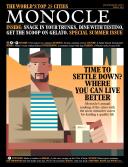
Issue 105
Snack in your trunks, dine with Testino, get the scoop on gelati. Plus: the hottest HQ
In This Issue
Oops! No content was found.
Looks like we no longer have content for the page you're on. Perhaps try a search?
Return Home
Click here to discover more from Monocle

Snack in your trunks, dine with Testino, get the scoop on gelati. Plus: the hottest HQ
Looks like we no longer have content for the page you're on. Perhaps try a search?
Return Home